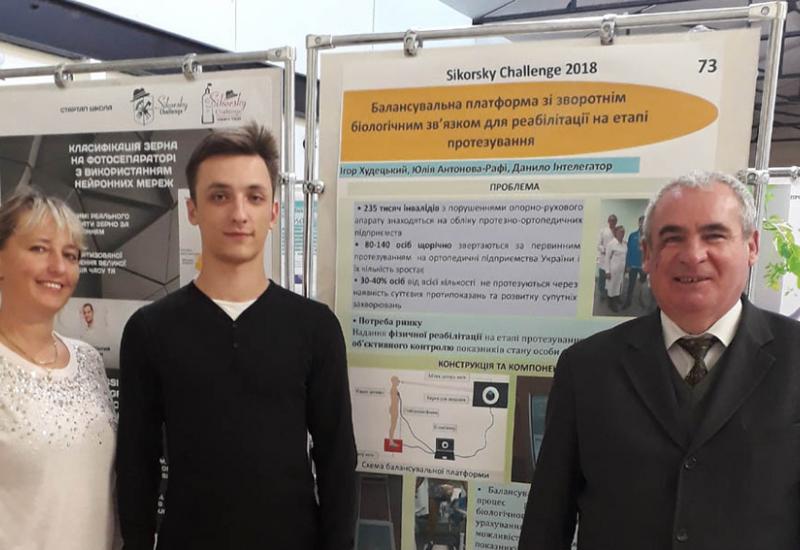At the competition of startups of Innovative Projects Festival “Sikorsky Challenge” the project from FBMI “Balancing platform with reverse biological connection for rehabilitation at the stage of prosthesis” won the nomination “The best technological decision”. It was admitted by the head of the jury Vik Korsun and Chinese Financial Company “Golden Egg”.
The authors of the project are the co-workers of Biosafety and Human Health Department of FBMI: Professor, Doctor of Medical Sciences Igor Hudetskiy, Associate Professor, Candidate of Technical Sciences Yuliya Antonova-Rafi and post-graduate student Danylo Intelegator (on photo)
Nowadays 235 thousands of disabled people with musculoskeletal system disorders are registered in prosthetic-orthopedic enterprises. Every year about 100 thousand people address orthopedic enterprises of Ukraine for the primary prosthetic and their number is increasing. However, 30-40% of people don’t make a prosthetic appliance because of significant contraindication, accompanying illnesses and impossibility to learn how to use prostheses in full.
In the majority of cases, people who had the amputation of lower limb, have the development of complex of pathophysiological and morpho-functional changes, the disorder of adaptive-compensatory reactions, the reduction of tolerance to physical activity and physical ability. Therefore, there is a demand for new means of physical therapy, aimed at reduction of negative changes and successful adaptation to prostheses. Physical rehabilitation which helps preparing to prosthetics and avoiding complexities is of great importance for patients’ socialization. An integral part of the process of prosthetics is the combination of physical rehabilitation and technical means, which estimate the person’s state in process of activity and represent the organism’s reaction to load. The aim of the development “Balancing platform for rehabilitation of disabled with amputation of the lower limbs” is to solve these rehabilitation tasks.
Rehabilitation simulator speeds up the resumption of motor functions, reduces time of the rehabilitation and improves the quality of life, patient’s socialization. The specialty of the device is the application of wireless control and management technologies, visualization of the dynamics of patient’s weight center displacement, availability of control over functional state and feedback in the load management system by patient’s weight compensation and limiting amplitude of platform oscillations.
Analysis of the amplitude of oscillations and efforts on its tops, which indicate complete or partial loss of equilibrium, physiological price of equilibrium restoration on the platform, allows managing the process of rehabilitation. In general, the simulator realizes the technology of rehabilitation, which involves transformation from the vertical position of the patient to a gradual increase of the amplitude of oscillations with a minimal load on the prosthesis in a static state. The base plate has a semi-cylindrical surface with the possibility of surging on one axis (left-to-right, forward-back or lateral directions) to rehearse the movements. Information about the process of training is provided by the sensors of patient’s weight, acceleration, angular displacement with the ability to demonstrate the indicators on the screen. After processing by a special computer program in the dynamics the data is analyzed and saved in the patient’s personal database. The simulator can be used in the process of physical therapy for a wide range of pathologies with syndrome of disturbance of equilibrium support, for example after ischemic strokes or long staying in a lying position. The simulator is mobile enough, easy to construct and dismantle.
On issues of development of rehabilitation equipment, the faculty of biomedical engineering of Igor Sikorsky Kyiv Polytechnic cooperates with Kyiv state experimental prosthetic and orthopedic enterprise, where the devices are tested. Most constructive solutions are patented.

